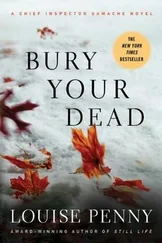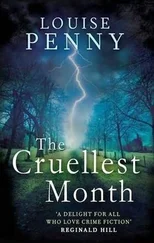As they carried Frère Mathieu through the Blessed Chapel, Gamache scanned the large room. The pews were empty. The long choir benches were empty.
Even the playful light had left. No more rainbows. No more prisms.
The absence of light wasn’t simply darkness. There was a gloom about the place, as though something else was gathering at the edges of the day. As cheerful as the light had been, something equally foreboding was waiting to fill the void.
Balance, thought Gamache, as their feet echoed on the slate floors. As they escorted a murdered monk across the church. Équilibre . Yin and yang. Heaven and Hell. Every faith had them. Opposites. Providing balance.
They’d had the daylight. And now the night was coming.
They passed out of the church and into the final, long corridor. Gamache could see the heavy wooden door at the far end. He could see the wrought-iron deadbolt rammed in place.
The door was locked. But against what?
They arrived and the Chief looked into the porter’s small office. But it too was empty. No sign of the young monk, Frère Luc. Only a thick book which proved to be more, what else? Chants.
Music, but no monk.
“It’s locked, patron, ” said Beauvoir, looking into the office. “The front door. Is there a key?”
Both men searched, but there was nothing.
Charbonneau opened the peephole and looked out. “I can see the boatman,” he reported, smushing his face against the wooden door. Trying for a better look. “He’s at the dock. Waiting. He’s looking at his watch.”
All three officers looked at their watches.
Twenty to five.
Beauvoir and Charbonneau looked at Gamache.
“Find the monks,” he said. “I’ll stay here with the body, in case Frère Luc returns. You split up. We haven’t much time.”
What had seemed an oddity, the sudden absence of monks, was now verging on a crisis. If the boatman left, they’d be stuck there.
“ D’accord ,” said Beauvoir, but he looked uneasy.
Instead of moving off down the corridor Beauvoir stepped toward the Chief and whispered, “Would you like my gun?”
Gamache shook his head. “I’m afraid my monk is already dead. Not much of a threat.”
“There are others, though,” said Beauvoir, deadly serious. “Including the one who did this. And the one who locked us in. You’ll be alone here. You might need it. Please.”
“Then what would you do, mon vieux, ” asked Gamache. “If you run into trouble?”
Beauvoir was silent.
“I’d rather you keep it. But remember, Jean-Guy, you’re looking for the monks, not hunting them.”
“Looking not hunting,” Beauvoir repeated in mock earnestness. “Got it.”
Gamache accompanied them to the end of the corridor, walking briskly to the door into the church. Opening it he looked in. No longer filled with light, it was now filled with long, and growing, shadows.
“ Père Abbé! ” Gamache stood at the door and shouted.
It felt as though he’d lobbed a bomb into the building. The Chief’s commanding voice bounded off the stone walls, magnifying and echoing. But instead of recoiling from it, Gamache yelled again.
“Dom Philippe!”
Still nothing. He stepped aside and Beauvoir and Charbonneau hurried in.
“Quickly, Jean-Guy,” Gamache said as Beauvoir passed. “Carefully.”
“Oui, patron.”
The Chief watched as the two men peeled off in different directions. Beauvoir to the right, and Charbonneau to the left. Gamache stood at the door, watching, until both men disappeared.
“ Allô! ” called Gamache again, and listened. But the only response he got was his own voice.
Chief Inspector Gamache propped open the door to the church, then started down the long corridor, to the closed and locked and bolted door. And the body that lay before it like an offering.
It was counterintuitive to walk deliberately into a dead end. A cul-de-sac . Every training, every instinct, went against it. If anything came at him down this corridor, there was no way out. He knew that was why Beauvoir had offered him his firearm. So that he’d at least have a chance.
How often had he, in classes at the academy, in sessions with new recruits, ordered them never, ever to get caught in a dead end?
And yet here he was, walking back down. He’d have to give himself a stern talking to, he thought with a smile. And a failing grade.
* * *
Jean-Guy Beauvoir stepped into the long corridor. It was exactly like all the others. Long, with tall ceilings and a door at the far end.
Emboldened by Gamache, Beauvoir yelled, “ Bonjour! Allô? ”
Just before the door had closed he’d heard the Chief’s and Charbonneau’s voices mix together. Calling out, in unison, a single word. “Allô?”
Then the door closed, and with it the familiar voices disappeared. All sound disappeared. There was silence. Except for the beating of Beauvoir’s heart.
“Hello?” he repeated, less loudly.
There were doors down either side. Beauvoir hurried along the corridor, looking into rooms. The dining room. The pantry. The kitchen. All empty. The only sign of life a huge vat of pea soup simmering on a stove.
Beauvoir opened the last door on the left, before the final door. And there he stopped. Staring. Then he stepped inside and the door softly closed behind him.
* * *
Captain Charbonneau opened the doors all the way down the hallway. One after another. All were alike.
Thirty of them. Fifteen down one side. Fifteen down the other.
Cells. He’d started off yelling into them, “Hello?” but soon realized there was no need.
This was obviously the bedroom wing. With the toilets and showers in the middle and the prior’s office at the very beginning of the corridor.
A large wooden door at the far end was closed.
The rooms were empty. He’d known that as soon as he’d stepped into the hallway. Not a living soul. But that didn’t mean there weren’t some dead ones.
And so he’d stooped to look under the first few beds. Dreading what he might find, but needing to look anyway.
Twenty years he’d been on the force. He’d seen some terrible things. Horrific accidents. Appalling deaths. Kidnappings, assaults, suicides. The disappearance of two dozen monks was far from the most frightening thing he’d experienced.
But it was the eeriest.
Saint-Gilbert-Entre-les-Loups.
Saint-Gilbert-Among-the-Wolves.
Who names a monastery that?
“ Père Abbé? ” he called, tentatively. “ Allô? ”
The sound of his own voice at first calmed him. It was natural, familiar. But the hard, stone walls changed his voice. So that what came back to his ears wasn’t exactly what had left his lips. Close. But not the same.
The monastery had twisted it. Taking his words and magnifying the feelings. The fear. Making his own voice grotesque.
* * *
Beauvoir stepped into the small room. Like the kitchen, there was a vat bubbling away on a stove. But unlike the kitchen, this one wasn’t pea soup.
It smelled bitter. Heavy. Not a pleasant aroma at all.
Beauvoir peered into the vat.
Then he dipped his finger into the thick, warm liquid. And smelled it. Looking around, to see if anyone was watching, he put his finger into his mouth.
He was relieved.
It was chocolate. Dark chocolate.
Beauvoir had never liked dark chocolate. It seemed unfriendly.
He looked around the empty room. No, not just empty. It was abandoned. The unattended vat glugged gently, like a volcano considering whether to explode.
And on the wooden counter sat small mounds of very dark chocolate. Long rows of them, like tiny monks. He picked one up, turning it this way and that.
Читать дальше











